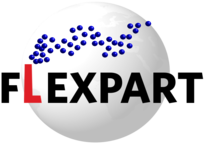Material of the FLEXPART V10.3 training: 1-3 July 2019
The course material including slides and software can be downloaded here.
The material consists of
- presentations (PDF) from the lectures and exercises,
- files needed per exercise and
- one mp4 file (video recording of the lecture on flex_extract). As it is quite big, you need to download it separately from https://www.flexpart.eu/downloads/67
Beside this, there is
- a script to download GFS data,
- a script to generate AVAILABLE files and
- a script to process and plot the output (for tracer, nuclear and volcanic simulations).
We recommend using ECMWF data, whose retrieval is explained in the flex_extract lecture and exercise. However, results obtained with GFS data are also included in this course. All is written in Python 2.7 or Fortran 90.
FLEXPART V10 requires the following Linux packages: gcc with gfortran, including development files grib_api netcdf including the Fortran library and e(optional) netcdf4 including the Fortran library and development files(optional)
The course material was prepared using flexpart_v10.3.1_3cd0f17 and
gcc/gfortran 4.9.2 grib_api 1.12.3 netcdf 4.3.3.1
The Ru106 exercises were prepared with:
gcc/gfortran 4.8.1 Python 2.7.5 emos 392 grib_api 1.11.0 netcdf 4.3.0 Magics 2.18.15
Probably, newer versions of the various software packages will also work.
NOTE ABOUT UPDATES SINCE 2019:
In the meantime, both flex_extract and FLEXPART have received updates. While for working through the exercises, it is best to use the versions provided here, we recommend that you use the most recent versions for any real applications. For FLEXPART see https://www.flexpart.eu/wiki/FpRoadmap and for flex_extract https://www.flexpart.eu/wiki/FpInputMetEcmwf
Note that there is also a public script to generate AVAILABLE files (mkAVAILABLE.py), as well as other plotting software, available from https://www.flexpart.eu/wiki/FpInputMetMkavail
For any general questions concerning this material, contact marie.mulder[at]zamg.ac.at. For questions related to specific topics, email addresses of the presenters are included in the lecture PDFs.
